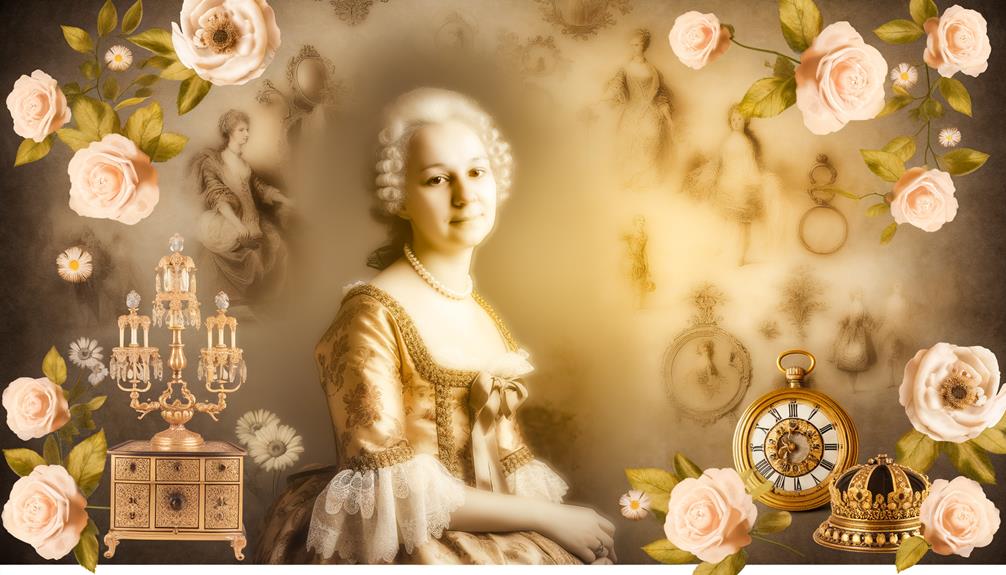Catherine Name Meaning and Origin
The name Catherine, derived from the Greek name 'Aikaterine', signifies purity and has deep historical roots. Its association with 'katharos', meaning 'pure', mirrors the cultural values of ancient Greece.
Over centuries, it has been borne by numerous saints and queens, such as Catherine of Alexandria and Catherine the Great, embodying power and piety. Variations like Katherine, Katrine, and Ekaterina reflect its global resonance.
In literature, the name appears in works by Brontë, Austen, and Hemingway, illustrating its versatility. Catherine's enduring popularity, with notable figures like Catherine, Duchess of Cambridge, further underscores its timeless appeal.
Continue to explore its fascinating legacy.

Key Takeaways
- Catherine is derived from the Greek name 'Aikaterine', meaning 'pure'.
- The name has historical significance, borne by saints, queens, and royals.
- Saint Catherine of Alexandria and Saint Catherine of Siena are notable bearers.
- It has various international adaptations, including Katherine, Catalina, and Ekaterina.
- The name has maintained consistent popularity from the Middle Ages to modern times.
Etymology of Catherine
Derived from the Greek name 'Aikaterine', the etymology of Catherine is complex and its origins are a subject of scholarly debate. Historical records indicate multiple potential roots, each contributing to its rich linguistic tapestry.
Some scholars suggest a connection to the Greek word 'katharos', meaning 'pure', while others propose links to the goddess Hecate, hinting at an ancient mythological origin. Additionally, the change from 'Aikaterine' to its Latin form 'Catherina' and subsequently to the English 'Catherine' underscores the name's evolution through cultural and phonetic shifts.
The multiplicity of these linguistic pathways highlights the intricate journey of the name through history, reflecting its enduring appeal and the varied influences that have shaped its modern form.
Ancient Greek Roots
Delving into the ancient Greek roots of the name Catherine reveals a fascinating intersection of linguistic evolution and cultural significance.
The name Catherine is derived from the Greek 'Aikaterine' (Αικατερίνη), which is traditionally linked to the word 'katharos' (καθαρός), meaning 'pure.' This connection to purity is not just a linguistic nuance but also reflects the cultural values of ancient Greece, where names often conveyed moral and ethical ideals.
The evolution of 'Aikaterine' into Catherine showcases how phonetic shifts and transliterations over centuries molded the name. Additionally, the Greek origins imbue the name with a timeless quality, resonating through various epochs and societies, underscoring its enduring appeal and depth within linguistic history.
Historical Significance
The name Catherine, with its rich Greek origins, also holds considerable historical significance, having been borne by numerous saints, queens, and distinguished figures throughout history, thereby cementing its place in the annals of cultural and religious heritage.
Historically, Catherine has been a preferred name in royal circles, especially among European monarchies. For instance, Catherine de' Medici, Queen of France in the 16th century, played a pivotal role in the political landscape of her time.
Linguistically, the name's endurance through centuries underscores its adaptability and resonance across cultures. Additionally, the name's prevalence in historical records reflects its integration into various societal strata, from nobility to commoners, signifying its widespread acceptance and reverence.
Saints Named Catherine
Among the numerous saints named Catherine, Saint Catherine of Alexandria and Saint Catherine of Siena are particularly venerated for their profound contributions to Christian theology and their enduring spiritual legacies.
Saint Catherine of Alexandria, a 4th-century scholar, is celebrated for her learned debates with pagan philosophers and subsequent martyrdom, symbolizing wisdom and courage in the face of persecution. Her name, derived from the Greek 'katharos,' meaning 'pure,' reflects her virtuous life.
Saint Catherine of Siena, a 14th-century mystic and Doctor of the Church, is renowned for her theological writings and mediatory role in the Avignon Papacy. Her name endures as a beacon of piety and intellectual fervor, emphasizing the spiritual purity inherent in its etymology.
Royal Connections
The name Catherine has been prominently associated with royalty throughout history, with notable figures such as Catherine the Great of Russia and Catherine of Aragon, the first wife of Henry VIII, exemplifying its regal connections.
This historical context has imbued the name with connotations of power and nobility, further cemented by contemporary royals like Catherine, Duchess of Cambridge.
The linguistic evolution of the name from its Greek origins, meaning 'pure,' to a symbol of royal influence underscores its enduring prestige in both historical and modern contexts.
Historical Royal Figures
Throughout history, the name Catherine has been prominently borne by numerous royal figures, influencing its perception and legacy within European aristocracy. The name traces its roots to the Greek word 'katharos,' meaning pure, a quality often associated with the regal stature it has come to exemplify. In addition to its royal connotations, the name Catherine also holds significance in religious and literary contexts, further adding to its allure and prestige. Its widespread popularity and timeless appeal can also be attributed to its hudson name origin, which has contributed to its enduring charm and continued usage across different cultural and societal landscapes.
Notable historical figures include Catherine de Medici, a pivotal Queen of France, and Catherine the Great, the renowned Empress of Russia who expanded the empire and modernized its administration. These women were not only pivotal monarchs but also cultural icons, solidifying Catherine as a name synonymous with power and refinement.
Their legacies underscore the name's enduring appeal and its profound impact on European royal history.
Modern Royal Influences
In contemporary times, the name Catherine continues to hold a significant presence within royal circles, exemplified by figures such as Catherine, Duchess of Cambridge, who has brought modern relevance and global recognition to the name.
This contemporary royal influence has cemented Catherine as a name synonymous with elegance, poise, and public service. Historically, the name's Greek origin, meaning 'pure,' complements its regal associations.
Key modern influences include:
- Catherine, Duchess of Cambridge: Known for her charitable work and fashion influence.
- Catherine of Braganza: Queen consort of England in the 17th century, whose legacy continues.
- Catherine, Princess of Wales: A title held by the Duchess after Queen Elizabeth II's passing.
- Catherine Middleton: Her maiden name, symbolizing a modern fairytale.
Variations and Spellings
The name Catherine boasts a rich tapestry of variations and spellings, influenced by historical and linguistic shifts over centuries.
Common spellings include Katherine, Kathryn, and Katharine, each reflecting different phonetic interpretations.
Additionally, international adaptations such as the French 'Catherine,' the Spanish 'Catalina,' and the Russian 'Ekaterina' illustrate the name's global resonance and enduring appeal.
Common Spelling Variations
Catherine, a name with deep historical roots, showcases a rich array of spelling variations across different cultures and languages. This occurrence highlights the name's enduring popularity and adaptability.
Each variation subtly reflects the linguistic nuances of its respective culture, while still preserving the name's core identity.
- Katherine: This Anglicized form is one of the most common and retains the classic elegance of the original.
- Katharina: Mainly used in German-speaking countries, this form adds a distinctive Teutonic flair.
- Katarina: A popular version in Slavic languages, it emphasizes the name's widespread appeal.
- Caterina: The Italian and Spanish iteration, highlighting the name's Mediterranean charm.
These variations demonstrate the name's versatility and its ability to transcend linguistic boundaries.
Historical Name Changes
How did the name 'Catherine' evolve through history to exhibit such diverse variations and spellings, reflecting the intricate tapestry of linguistic and cultural influences across centuries?
Initially rooted in the Greek name 'Aikaterine,' its journey began with the early Christian martyr, Saint Catherine of Alexandria.
The name evolved through Latin as 'Catherina,' reflecting the Roman Empire's linguistic influence.
Medieval Europe saw further adaptations: 'Katherine' in England, 'Katharina' in Germany, and 'Caterina' in Italy, each mirroring regional phonetic preferences and orthographic norms.
The introduction of the French form 'Catherine' during the Norman Conquest further diversified its usage.
These historical shifts exemplify the name's dynamic evolution, shaped by religious significance, cultural exchanges, and linguistic developments.
International Adaptations
Reflecting a rich tapestry of linguistic evolution and cultural interchange, the name 'Catherine' exhibits a myriad of international adaptations that underscore its profound historical and geographical influence. Originating from the Greek name 'Aikaterine', which may derive from 'katharos' meaning pure, its journey across different cultures has led to numerous variants.
These adaptations often reflect phonetic adjustments to fit local languages and dialects.
- Katherine: An English variation that retains the essence of the original.
- Katrine: A Scandinavian adaptation, highlighting Nordic linguistic influences.
- Catalina: A Spanish variation, illustrating the name's integration into Latin cultures.
- Ekaterina: The Russian form, demonstrating the name's adaptability within Slavic languages.
Such variations reveal the dynamic interplay between language, culture, and history.
Catherine in Literature
In the world of literature, the name Catherine has been used by numerous authors to evoke a sense of nobility, strength, and complexity in their characters. Especially, Catherine Earnshaw in Emily Brontë's 'Wuthering Heights' exemplifies intense emotional depth and resilience. Catherine Morland in Jane Austen's 'Northanger Abbey' embodies youthful curiosity and growth. Moreover, Catherine Barkley in Ernest Hemingway's 'A Farewell to Arms' portrays grace under pressure during wartime.
| Character | Author | Attributes |
|---|---|---|
| Catherine Earnshaw | Emily Brontë | Passionate, strong |
| Catherine Morland | Jane Austen | Naive, evolving |
| Catherine Barkley | Ernest Hemingway | Compassionate, brave |
| Catherine Sloper | Henry James | Innocent, determined |
These literary Catherines reflect diverse qualities, enriching the name's rich literary heritage.
Popularity Over Time
Tracking the popularity of the name Catherine over time reveals significant fluctuations influenced by historical events, cultural shifts, and notable individuals. Historically, the name saw a surge during the Middle Ages, largely attributed to the reverence of Saint Catherine of Alexandria. During the Renaissance, Catherine de' Medici's influence as Queen of France further bolstered the name's prominence.
The Victorian era saw a resurgence in the 19th century, driven by literary references and royal associations.
In the 20th century, the name remained consistently popular, often ranking within the top 100 names in the United States.
A decline was noted in the late 20th century as naming trends shifted towards shorter, modern names.
In the 21st century, the name has seen periodic revivals, often influenced by celebrities and cultural nostalgia.
These trends reflect broader societal changes and the enduring appeal of classic names.
Modern Usage
Despite the shifts in popularity over the centuries, the name Catherine maintains a steady presence in modern times, adapting to contemporary naming trends while preserving its historical resonance.
This timeless name, rooted in Greek origins, continues to be favored for its classic elegance and versatility. Modern parents often appreciate its various spellings—such as Katherine, Kathryn, and Cathryn—each offering a unique twist while retaining the name's intrinsic dignity.
Additionally, the name Catherine has a rich cultural legacy, appearing frequently in literature and history, which adds to its enduring appeal. In contemporary contexts, diminutives like Kate, Katie, and Cat provide informal options, making Catherine a multifaceted choice that seamlessly bridges the past and present.
Conclusion
The name Catherine, with its rich etymological roots in ancient Greek, historical significance through numerous saints and royal connections, and varied literary appearances, has maintained its popularity over time.
A detailed analysis reveals that its consistent usage across different cultures and epochs underscores its enduring appeal.
For instance, the regal presence of Catherine the Great of Russia exemplifies the name's association with power and influence, illustrating its timeless relevance in both historical and modern contexts.






